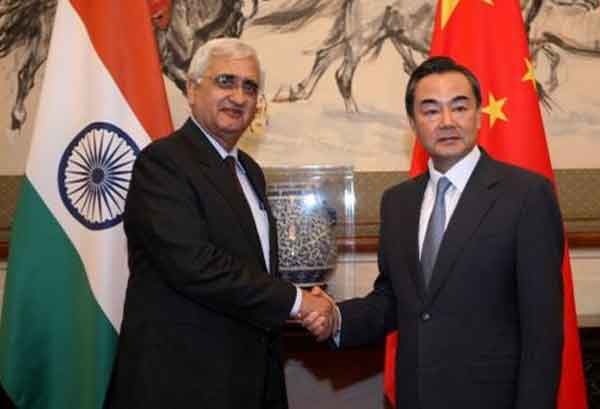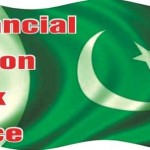IDR Blog
Good Governance and Foreign Policy

External Affairs Minister Salman Khurshid shakes hands with his Chinese counterpart during a meeting in Beijing
As had been the practice with his predecessors, Prime Minister Manmohan Singh has started the exercise of rewarding or taking interests of his close civilian officers before demitting office. That it is a distinct sign of his realisation that the Congress stands no chance of retaining power in the coming general elections is a different matter. It is natural for him to ensure that officials closely associated with him get good positions before his innings comes to an end. It is in this context that the running gossips in the power corridor here that Vikram Mishri, Joint secretary to the Prime Minister, is being shifted to Spain as Ambassador in place of Sunil Lal, who, in turn, is being shifted to Turkey. It is also rumored that the Prime Minister is keen to send National Security Advisor (NSA) Shiv Shankar Menon to Jammu and Kashmir as the Governor, under the belief that even a possible Narendra Modi-led government at the Centre will not disturb Menon as he is reportedly close to a senior BJP leader, who was a very important minister under Prime Minister Atal Behari Vajpayee.
As an institution, the MEA has never been as weak as it is today, virtually surrendering, as it has, its authority to the Prime Minister’s Office.
I have deliberately chosen to cite these two officials because of the fact that they are members of elite Indian Foreign Service (IFS). Of course, Menon is a retired Foreign Secretary and his present job is a political appointment. But what is important is that under Manmohan Singh’s tenure the Ministry of External Affairs, the ministry that handles the IFS and is supposed to be managing the country’s external relations, has lost most of its sheen. As an institution, the MEA has never been as weak as it is today, virtually surrendering, as it has, its authority to the Prime Minister’s Office. The base of the foreign-policy making, always small, has become smaller under Manmohan Singh. MEA’s inputs to the foreign policy making have become virtually negligible, everything being determined by the Prime Minister along with his NSA, a close coterie supporting them.
I am not going into the issue of the foreign policy achievements/failures under Manmohan Singh. I will deal with that issue in a separate column in future. Here, I want to focus on the institutions, processes and practices pertaining to India’s foreign policy making. This is important to be highlighted as the term “good governance” is the most important slogan these days in the Indian polity. If “good governance” is going to be a determining factor in the formation of the next government, then it is worth exploring how this will affect the country’s foreign policy.
Until recently foreign policy was considered to be specialised subject needing specialised treatment. IT hardly mattered in the country’s elections. Hardly, the Indian Parliament witnesses lively debates on foreign policy and security issues. The country’s first Prime Minister Jawaharlal Nehru kept the portfolio of the foreign affairs with himself. It is he and his immediate coterie set the direction of foreign policy. Parliament was only being informed of his decision. In a sense, the same continues to be the trend even now. As has been pointed out by union minister Shashi Tharoor, otherwise a reputed scholar of international affairs, only about 5% of questions posed in “Question Time” in Parliament concern foreign policy issues. If the Consultative Committee of Parliament for the MEA met rarely under Nehru and his immediate successors, today’s Standing Committee on External Affairs, according to Tharoor, generally spends its time meeting and greeting foreign delegations!
The chiefs of the armed forces are not present at the highest councils of government and nor are they routinely consulted about major foreign or even security policy issues.
It is not only the Parliament of the world’s largest democracy that does not play an active role in the foreign policy or strategic matters. Another vital institution – the military – also has not been able to play this role. In fact, the military has been scrupulously kept at a self distance as far as providing inputs are concerned. As Stephen Cohen, one of the most perceptive scholars on Indian Military, says, “probably no military of equivalent importance or size (of India) has less influence over the shaping of policy at the highest level”. The chiefs of the armed forces are not present at the highest councils of government and nor are they routinely consulted about major foreign or even security policy issues.
In a highly perceptive piece in highly influential Foreign Affairs (May/June 2013) magazine, Manjari Chatterjee Miller, who teaches at Boston University, found out three limitations in India’s foreign policy making process. First, she thinks that “New Delhi’s foreign policy decisions are often highly individualistic — the province of senior officials responsible for particular policy areas, not strategic planners at the top. As a result, India rarely engages in long-term thinking about its foreign policy goals, which prevents it from spelling out the role it aims to play in global affairs”. Secondly, she argues that “Indian foreign-policy makers are insulated from outside influences, such as think tanks, which in other countries reinforce a government’s sense of its place in the world”. And thirdly, “the Indian elite fears that the notion of the country’s rise is a Western construct, which has unrealistically raised expectations for both Indian economic growth and the country’s international commitments”, she writes.
Talking of the Indian Foreign Service, whose officers are vital to India’s successful diplomacy, Manjari says that unlike in the United States and elsewhere, career diplomats in India dominate all the top diplomatic positions. “The powerful role of the Indian Foreign Service produces a decision-making process that is highly individualistic. Since Foreign Service officers are considered the crème de la crème of India and undergo extensive training, they are each seen as capable of assuming vast authority. What is more, the service’s exclusive admissions policies mean that a tiny cadre of officers must take on large portfolios of responsibility. In addition to their advisory role, they have significant leeway in crafting policy. This autonomy, in turn, means that New Delhi does very little collective thinking about its long-term foreign policy goals, since most of the strategic planning that takes place within the government happens on an individual level”. A former ambassador to several European countries told her, “I could never find any direction or any paper from the foreign office to tell me what India’s long-term attitude should be toward country X. Positions are the prerogative of the individual ambassador.”
 This lack of top-down instruction means that long-term planning is virtually impossible. This problem is further compounded by the fact that the Foreign Service is a highly exclusive outfit. Manjari writes, “ The foreign service’s exclusive admissions policies leave New Delhi short-staffed in that arena, and overburdened foreign service officers have little time or inclination for strategic thinking. As the ambassador with ties to the national security adviser’s office told me, ‘It’s hard for people to focus on a long-term strategy because they deal with day-to-day thinking’.” And this absence of grand strategic thinking in the Indian foreign policy establishment is further amplified by what she says “the lack of influential think tanks in the country. Not only is the foreign service short-staffed, but its officers do not turn to external institutions for in-depth research or analysis of the country’s position. U.S. foreign-policy makers, by contrast, can expect strategic guidance from a broad spectrum of organizations that supplement the long-term planning that happens within the government itself.”
This lack of top-down instruction means that long-term planning is virtually impossible. This problem is further compounded by the fact that the Foreign Service is a highly exclusive outfit. Manjari writes, “ The foreign service’s exclusive admissions policies leave New Delhi short-staffed in that arena, and overburdened foreign service officers have little time or inclination for strategic thinking. As the ambassador with ties to the national security adviser’s office told me, ‘It’s hard for people to focus on a long-term strategy because they deal with day-to-day thinking’.” And this absence of grand strategic thinking in the Indian foreign policy establishment is further amplified by what she says “the lack of influential think tanks in the country. Not only is the foreign service short-staffed, but its officers do not turn to external institutions for in-depth research or analysis of the country’s position. U.S. foreign-policy makers, by contrast, can expect strategic guidance from a broad spectrum of organizations that supplement the long-term planning that happens within the government itself.”
…democratisation of India’s foreign policy needs a relook at the very process of foreign policy-making. There has to be “Good governance” here.
What Manjari has not written on is that that even this exclusivist MEA has become powerless under Manmohan Singh. If MEA is exclusive, more exclusive is the system in the PMO that is controlling the country’s foreign policy these days. But that does not detract from the point that as is the case with other public services, the IFS must be strengthened and encouraged to value accountability and performance management. And what is equally important is that India’s foreign policy-making must be “democratised”. All told, the nature of Indian polity and governance is changing. Gone are the days of a single-party rule, a factor that facilitated the ruling party leader (the Prime Minister) to dictate foreign policy. This is an age of coalitions. And here, the regional parties are playing an important role. It so happens that most of the important regional parties that happen to govern the border states have important concerns with the neighboring countries that are different from the concerns seen from New Delhi. See the way Punjab and Jammu and Kashmir look at Pakistan, West Bengal looks at Bangladesh, and Tamil Nadu looks at Sri Lanka. Even national parties like the BJP and CPM have their respective world views. Besides, there are development-oriented chief ministers like Narendra Modi who are interacting directly with the foreign players on issues such as loans and investment. They now travel abroad regularly. Even otherwise, free trade agreements on agriculture and other industries that the central government negotiates with foreign governments can succeed only if the chief ministers of the states concerned agree. Viewed thus, the foreign policy of India is getting increasingly federalised. This development is getting further buttressed by the emergence of a series of new think-tanks, pressure groups and the educated middle class keen to shape public opinion on foreign policy issues.
Given these emerging trends, the extremely narrow-base of the foreign policy making under Manmohan Singh is really surprising. For example, he has not been able take Mamata Banerjee and Jaya Lalitha along in deciding the contours of our policies towards Bangladesh and Sri Lanka respectively. His idealistic policies towards Pakistan and China are not working realistically because there have been no inputs of the military in them. No wonder why the present government’s neighbourhood policy is most disappointing. In other words, democratisation of India’s foreign policy needs a relook at the very process of foreign policy-making. There has to be “Good governance” here.
Post your Comment
2 thoughts on “Good Governance and Foreign Policy”
 Loading Comments
Loading Comments




One should learn from experience. Not repeat the same. While diplomat relations held between countries. It should develop good relation between the citizens of each, rather than developing personal relations for selfish gain. If Indians are apprehended in a foreign land the Indian Diplomat ought to spring into action with the local authorities, parallel y, inform the families of those Indians held. Whereas the Indians were treated shabbily as convicts before trials for nine long months and conviction based on the nature of crime, cooked up since ditched by their local sponsors..Primarily the families of the Indians held at Togo Port were not officially informed from the authorities of the country were held nor from indian diplomats.?
REMINDER: VERY URGENT
H.E. The High Commissioner Shri K. Jeeva Sagar, Dt. 23rd Dec.2013 /29/1/2014 High Commission of India, No. 9 Ridge Road, Roman Ridge
PO Box CT-5708, Cantonments, ACCRA (GHANA) Tel: +233-307020903 / 307020904 / 307020905. Fax: +233-302772176, Email: hoc.accra@mea.gov.in
Most Respected Sir,
This is with reference to the talk I had with your Excellency, this (A/N) over the phone.
Thanks for your valued advice, we will certainly keep continuing to go to temple, praying to god and will not waste on phones, assuring “it would not be as fast as we think”, as the work process in courts are slow all over, includes India, our country as well and not as fast as we expect but however retaining my younger son Ashok Chandran Peechulli, who was working onboard the Tanker vessel “M.T. Ocean Centurian” while releasing the other two officers were not fair and just to my little knowledge known on Labour and Administrative Laws.
While self sailing (Chief Engineer), and the Captain in the year 2000, were in Port Libreville, then we were relieved of all our ornaments we wore ie. Neck chain, finger rings, bracelet, money-purse etc by way-laying us. Similarly, it appears my son’s were also relieved now of their jewels.
Please find attached few photographs Pictures 7 to 13, under ANNEXURE A., wherein My eldest son son, Capt. Arun Chandran Peechulli, had submitted papers on “Anti-Piracy” and attended seminars/symposium sponsored by the U.S.Consul General, at Chennai, India and his papers were despatched to the U.S. such a personality, can never be imagined to be branded as a pirate, for his rich background, being an alumni of “GCNS” (Glasgow College of Nautical Studies and Warsash Maritime Academy, Southampton, U.K., he had also expressed to do Doctorate, with his thesis paper on “Piracy” an international menace…